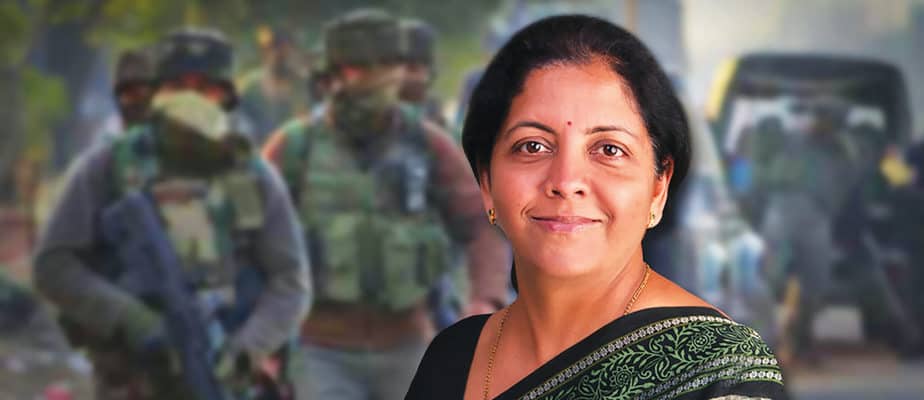
With one nod of her head, Nirmala Sitharaman has caused the greatest divide between the armed forces and civilian community in the country in the nation’s 70-year history. Social media is abuzz with pro- and anti-military lobbies, solely on the closing and subsequent opening of 62 roads within cantonments. An editorial in The Statesman even went on to imply that opening cantonments would pave the way for more skeletons to fall from the Army’s closets. It was signalling a victory over the nation’s Army by its own populace.
The battle began in Secunderabad but has now spread across the country. A video doing the rounds on social media showed a collection of vehicles with BJP flags forcing their way into Danapur cantonment near Patna, with loud music blaring, celebrating the opening of the cantonment. The symbolism should not be missed: it is the governing BJP celebrating a victory over its own Army. Is this what Sitharaman wanted?
Across the nation, cantonments which were sacred, secure and clean have suddenly become exploitable. Basic checks imposed even in malls and hotels are taboo. This raises serious questions surrounding security, with all and sundry now welcome in these areas. The vulnerability and insecurity of residents have increased, with people drinking, misbehaving, and driving with blaring horns on what were once silent cantonment roads, even as police visibility is less.
Civilians and the military — who had respected and understood one another — have suddenly become enemies, thanks to Sitharaman. Demands for access are rising, and security has taken a backseat. Cantonments are now becoming a battleground between civil and Army authorities, with the Army being considered as occupiers in their own habitat.
In March 2017, a reporter of The Quint, Poonam Aggarwal, did a sting operation on jawans in Devlali. The jawan later committed suicide. Aggarwal was booked for illegally entering a prohibited area and abetment to suicide. Under Sitharaman’s new decree, there are no prohibited areas. Anyone can go anywhere and do whatever they want, including taking pictures of defence equipment, family accommodation, and other installations, and then post them on social media sites.
Intelligence agencies apprehending Pakistan spies possessing photographs of military installations will never be able to obtain a conviction in court, as cantonments are now open for everyone. All this because of a collection of bureaucratic omissions committed by Nirmala Sitharaman.
This is not about the legality of the decision, but I question the manner adopted and the message it sends across the country.
Her first bureaucratic crime was that on the advice of her bureaucracy, she called a meeting of the vice presidents of Cantonment Boards across the country, local MPs, and senior officials of the ministry and the Principal Director Defence Estates. Those involved were civilians, whose views are completely one-sided with no concern for security since that remains a military matter. Presidents of cantonment boards, serving army officers, and those responsible for cantonment security were ignored, nor were their views even sought.
In attendance was a sole army representative, Director General of Land Works & Environment, whose role was to issue directions on decisions taken. Claims of having discussed with the Army Chief make no sense, as the Army representatives from the affected regions were not even invited, nor consulted. The Army Chief, ironically, was in Kashmir, reviewing the security situation. Sitharaman should have visited some cantonments to understand the reasons why restrictions had been placed and whether a unilateral decision was essential, or whether it could have been taken on a case by case basis.
The second major crime was issuing this unilateral order, opening all roads, irrespective of where they were headed. An unthinkable act, by a ministry and a minister, whose prime responsibility is ensuring national security.
The third crime was to issue a subsequent letter, stating that if any roads are to be closed in future, the MoD was to be the final authority. It clearly implies lack of trust in the military and a decision to be taken by a bureaucrat, who is neither responsible nor accountable for security.
Finally, after a meeting with representatives of affected families of serving military personnel, she promised a review after a month, clearly implying their security means little, local votes mean more.
These four points, when looked at in totality, would hurt the BJP in the forthcoming elections, despite any promises Modi may make or any action his government may take to appease the serving or veteran community. Sitharaman is now in a jam. Going back on her decision would anger local politicians and locals, whom she helped by opening all roads. However, this decision has already angered the military community, both veteran and serving, especially if there’s no review after a month, as promised to the families that met her. This has joined the list that has already hurt the army communities, like non-implementation of OROP (One Rank, One Pension), the removal of rations, and no NFU (non-functional upgradation).
With this hasty decision of opening roads without seeking the right advice from those that matter, the vulnerability of cantonments has increased. The nation is celebrating victory over its own Army. The government has highlighted that the army will be exploited for elections but ignored thereafter.
This action will boomerang as internal anger, disappointment and loss of trust are creating an anti-BJP environment within the serving, veteran and pro-army forces within the country. It will be exploited by all other political parties.
www.newslaundry.com
On the principle of 'Sarvajan Hitaya, Sarvajan Sukhaya' -- Welfare for all, Happiness for all…
With hundreds reported missing in Delhi this year, this guide explains how families can use…
The case came to light after a 35-year-old woman from Panipat alleged that she had…
During the investigation, CCTV footage helped identify the suspects, according to Delhi Police
The launch took place during the inauguration of the Delhi Police Exhibition Hall at Connaught…
The 28-year-old factory owner was taken to Satyawadi Raja Harish Chandra Hospital in Delhi, while…